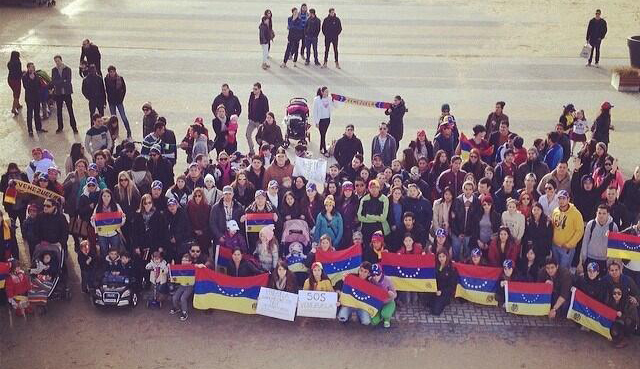Dozens of people took to Bournemouth’s sea front on Sunday in support of anti-government protests in Venezuela.
Around 60 flag-carrying students and young people took part, many from Venezuela. It was organised at short notice using Facebook.
Protester Tomás De La Rosa Silva said, “There is a lot of censorship in Venezuela, and this has led to students and the opposition protesting against the government.
“Its policies have resulted in insecurity – there is a shortage of basic necessities, even toilet paper.”
“People are afraid of coming out on the street” – Tomás De La Rosa Silva
De La Rosa said that the government was responsible for a number of deaths during the protests.
“The protests have become violent due to the violence of the national guard and police,” he said.
“People are afraid of coming out on the street and not sure if they’ll come back alive.”
But Dr Francisco Dominguez from the Venezuela Solidarity Campaign disagreed.
Pressure
“This is a radical approach by some of the middle class,” said Dominguez. “A group called La Salida [the Ousting] wants to bring political pressure using street mobilisations to end the administration of President Nicolas Maduro.”
He added that the protests have featured “extreme right wing violence” aimed at ousting the recently elected Maduro, an ally to former president Hugo Chavez.
“The government took very energetic steps to reduce over-pricing, and this was very popular,” added Dominguez, citing widespread support for government candidates in December’s municipal elections.
“The opposition seem to have drawn the conclusion that unless they do something now, the government will consolidate itself and it will be impossible to win elections in future,” he continued, adding that only part of the opposition supported the street movement.
“I find the ‘repression’ characterisation of the student protests questionable” – Journalist Ewan Robertson speaks to the Breaker from Venezuela
The anti-government actions began on 12 February after a call from opposition leaders Leopoldo López, María Corina Machado and Antonio Ledezma. Other opposition figures, including former presidential candidate Henrique Capriles, have distanced themselves from civil disobedience.
On Sunday the governments of Brazil, Argentina, Uruguay and Paraguay condemned the protests, which have left an estimated five people dead from both sides of the conflict.
Mobilisations in support of the Venezuelan opposition also took place in London, Madrid, Berlin and other major cities. A further protest is expected to take place in London this weekend.







